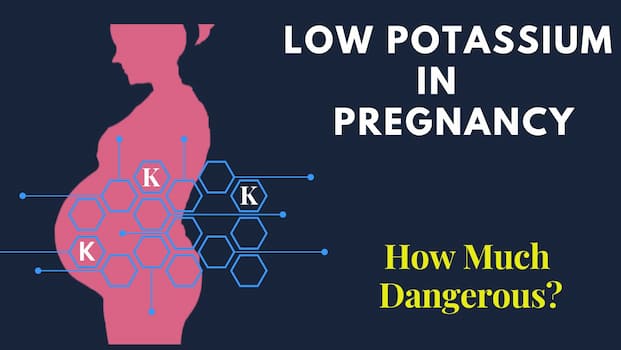
Pregnancy is a remarkable journey filled with changes and adaptations within the body. Maintaining adequate nutrient levels is crucial during this time, including potassium, an essential mineral. In this article, we will explore the topic of low potassium in pregnancy, its symptoms, causes, diagnosis, treatment options, dietary sources, and address common questions associated with this condition.
Pregnant women can experience low potassium levels, or hypokalemia, if they lose potassium through diarrhea or vomiting. Low potassium levels can cause symptoms like muscle cramps, constipation, weakness, and irregular heartbeats. This is because potassium plays an important role in muscle and nerve function, as well as blood pressure regulation.
Table of Contents
What is potassium?
Potassium is important mineral and an electrolyte, which is essential for many bodily functions, including:
- Regulating fluid balance
- Transmitting nerve signals
- Contracting muscles
- Maintaining a healthy heartbeat
During pregnancy, potassium levels are typically higher than normal to support the growth of the baby. However, some pregnant women may develop low potassium levels, also known as hypokalemia.
Why is potassium needed during pregnancy?
Potassium is especially important during pregnancy for the following reasons:
- It helps to regulate blood pressure, which can help to reduce the risk of preeclampsia.
- As an essential electrolyte, potassium plays a crucial role in maintenance of proper fluid balance.
- It helps to prevent muscle cramps, which are a common complaint during pregnancy.
- It helps to support the growth and development of the baby’s brain and nervous system.
What is the normal level of potassium in blood during pregnancy?
A study of potassium levels in normal pregnant women found that the average serum potassium concentration was 5.65 millimoles per liter (mmol/l). This level decreased with maternal age and parity (number of previous pregnancies) but increased progressively with gestational age, reaching its highest levels in the third trimester. In the first trimester, the average potassium level was 4.25 mmol/l, which increased to 5.83 mmol/l in the second trimester and 5.95 mmol/l in the third trimester.
How does low potassium levels affect your pregnancy?
Low potassium levels during pregnancy, also known as hypokalemia, can cause a variety of health problems for both the mother and the baby. Some of the potential complications of hypokalemia during pregnancy include:
- Premature labor: Hypokalemia can increase the risk of premature labor, which is when a baby is born before 37 weeks of pregnancy.
- Weakness, fatigue, muscular cramps, and constipation.
- Heart problems: Hypokalemia can cause irregular heartbeats, which can be dangerous for both the mother and the baby.
- Muscle weakness: Hypokalemia can cause muscle weakness, which can make it difficult for the mother to move around and care for herself and her baby.
- Seizures: In severe cases, hypokalemia can cause seizures, which can be life-threatening.
If you are pregnant and you have low potassium levels, it is important to see your doctor right away. They can order a blood test to check your potassium level and advise you on how to increase your potassium intake. You may need to take potassium supplements or make changes to your diet to increase your potassium intake.
Symptoms of low potassium during pregnancy

The symptoms of low potassium during pregnancy can vary depending on the severity of the deficiency. Mild cases may not cause any symptoms, while more severe cases can lead to the following:
- Fatigue
- Muscle weakness or cramps (especially leg cramps)
- Constipation
- Numbness or tingling in the hands and feet
- Irregular heartbeat
- Difficulty breathing
- Edema, mostly in legs and ankles
- Dizziness
- High blood pressure
- Seizures
- Depression
Most of the symptoms of low potassium in blood are similar to the symptoms of pregnancy. That is why it is important to get your blood tested to confirm a low potassium level.
Causes of low potassium during pregnancy
There are a number of things that can cause low potassium levels during pregnancy, including:
- Nausea and vomiting. Severe morning sickness, known as hyperemesis gravidarum, which is a common symptom of pregnancy, can cause excessive nausea and vomiting and lead to dehydration and electrolyte imbalances, including low potassium levels.
- Inadequate Dietary Intake. A lack of potassium-rich foods in the diet can contribute to low potassium levels. Pregnancy increases the body’s potassium requirements, making it essential to consume foods such as bananas, avocados, spinach, and sweet potatoes.
- Diarrhea. This can also lead to potassium loss.
- Certain medications. Some medications, such as diuretics (water pills), can increase the risk of low potassium levels. Some pregnant women may be prescribed diuretic medications to manage conditions like high blood pressure, which can inadvertently lower potassium levels.
- Preexisting medical conditions. If you have a medical condition that affects potassium levels, such as kidney disease or Addison’s disease, you may be at an increased risk of developing low potassium levels during pregnancy.
How to diagnose low potassium during pregnancy
- Medical history and physical examination: Your doctor will ask you about your medical history, including any recent illnesses or medications you are taking. They will also perform a physical examination, looking for signs of low potassium, such as muscle weakness, fatigue, or irregular heartbeat.
- Blood tests: A blood test is the most common way to diagnose low potassium in blood. Your doctor may order a blood test as part of a routine prenatal checkup, or if you have any symptoms of low potassium.
If your blood test shows that you have low potassium, your doctor will work to determine the cause and recommend treatment.
Treatment for low potassium during pregnancy
The treatment for low potassium during pregnancy depends on the severity of the deficiency. Mild cases may be treated with dietary changes, such as eating potassium-rich foods. More severe cases may require potassium supplements or intravenous (IV) potassium.
Dietary sources of potassium

There are many foods that are good sources of potassium. Some of the best dietary sources of potassium include:
- Fruits: bananas, oranges, cantaloupe, honeydew melon, apricots, raisins
- Vegetables: potatoes, sweet potatoes, spinach, broccoli, tomatoes, lima beans
- Dairy products: milk, yogurt, cheese
- Fish: salmon, tuna, halibut
- Nuts and seeds: almonds, peanuts, sunflower seeds
Tips for increasing potassium intake during pregnancy
If you are pregnant and have low potassium levels, there are a few things you can do to increase your potassium intake:
- Take Balanced Diet: A well-balanced diet rich in potassium is vital for maintaining optimal levels during pregnancy. Include potassium-rich foods such as bananas, oranges, tomatoes, leafy greens, yogurt, and nuts in your daily meals.
- If you are taking potassium supplements, talk to your doctor about the correct dosage.
- Stay hydrated by drinking sufficient water throughout the day. This can help prevent dehydration, which can contribute to electrolyte imbalances.
- Eat small, frequent meals: Instead of consuming large meals, opt for smaller, more frequent meals and snacks. This can aid digestion and absorption of nutrients, including potassium.
- Medical Supervision: Regular prenatal check-ups are essential to monitor potassium levels and address any deficiencies or imbalances promptly. Inform your healthcare provider if you experience any concerning symptoms.
- Limit your intake of processed foods, which are often low in potassium.
- If you are taking diuretics, talk to your doctor about whether you need to take a potassium supplement.
Frequently Asked Questions:
Can low potassium levels cause miscarriage?
No, low potassium levels in pregnancy are not known to cause miscarriage.
There is no direct evidence to suggest that low potassium levels alone can cause miscarriage. Miscarriage is a complex event that can occur due to various factors, including genetic abnormalities, hormonal imbalances, maternal health conditions, infections, or certain lifestyle factors.
While low potassium levels are not a known direct cause of miscarriage, it is important to maintain adequate nutrient levels, including potassium, during pregnancy to support the overall health and well-being of both the mother and the developing baby. Potassium plays a crucial role in various physiological processes, and severe deficiencies in potassium could potentially have adverse effects on pregnancy.
If you are concerned about your potassium levels or have any concerns about miscarriage, it is recommended to consult with your healthcare provider.
Can low potassium affect your baby while pregnant?
Yes, low potassium levels during pregnancy can potentially affect the baby. Potassium is an essential mineral that plays a crucial role in various bodily functions, including the development and functioning of the baby’s muscles, nerves, and heart. Insufficient potassium levels in the mother’s body can impact the baby’s growth and development.
Low potassium during pregnancy may increase the risk of certain complications, such as:
1. Abnormal fetal development: Potassium deficiency can impair the baby’s muscle and nerve development, potentially leading to issues with motor skills and overall growth.
2. Preterm labor: Low potassium levels during pregnancy have been associated with a higher risk of preterm labor. Inadequate potassium can interfere with uterine contractions, potentially triggering the onset of preterm labor.
3. Increased blood pressure: Potassium helps regulate blood pressure. Insufficient potassium levels can contribute to high blood pressure in the mother, which can affect the baby’s blood supply and nutrient delivery.
It is important for expectant mothers to maintain optimal potassium levels to support the healthy growth and development of their baby.
Does low potassium mean preeclampsia?
No, low potassium does not necessarily mean preeclampsia. Preeclampsia is a serious pregnancy complication characterized by high blood pressure, protein in the urine, and sometimes other symptoms. Low potassium, also known as hypokalemia, is a condition in which the level of potassium in the blood is too low. While low potassium can be a symptom of preeclampsia, it can also be caused by other factors, such as vomiting, diarrhea, and diuretic use.
Conclusion
- Low potassium in pregnancy can lead to various symptoms such as fatigue, muscle cramps, irregular heartbeat, and digestive issues. Recognizing these signs is essential for early detection and intervention.
- Several factors can contribute to low potassium levels during pregnancy, including increased potassium requirements, inadequate dietary intake, conditions like hyperemesis gravidarum, diuretic use, and gestational diabetes. Identifying and addressing these causes is crucial for managing potassium deficiency.
- Diagnosing low potassium during pregnancy involves a combination of medical history assessment, physical examination, and blood tests. These diagnostic measures help healthcare providers accurately identify and evaluate potassium levels.
- Treatment options for low potassium during pregnancy may include dietary changes, potassium supplements, or, in severe cases, intravenous potassium administration. Following healthcare provider recommendations is essential for proper management.
- Maintaining a balanced diet rich in potassium-rich foods is vital during pregnancy. Incorporating fruits, vegetables, legumes, nuts, dairy products, fish, and meat can help meet the potassium requirements naturally.
- Regular prenatal check-ups and open communication with healthcare providers are essential for monitoring potassium levels and addressing any concerns during pregnancy.
By understanding the significance of maintaining adequate potassium levels, expectant mothers can take proactive steps to ensure a healthy pregnancy.
References
- Tomala J, Jendryczko A, Kossowski P. Serum potassium levels during pregnancy. Zentralbl Gynakol. 1994;116(5):285-8. PMID: 8023626.
- I. D. Weiner and C. S. Wingo, “Hypokalemia–consequences, causes, and correction,” Journal of the American Society of Nephrology, vol. 8, no. 7, pp. 1179–1188, 1997.
- Yang CW, Li S, Dong Y. The Prevalence and Risk Factors of Hypokalemia in Pregnancy-Related Hospitalizations: A Nationwide Population Study. Int J Nephrol. 2021 Jun 28;2021:9922245. doi: 10.1155/2021/9922245. PMID: 34258064; PMCID: PMC8261188.
- Yang CW, Li S, Dong Y. The Prevalence and Risk Factors of Hypokalemia in Pregnancy-Related Hospitalizations: A Nationwide Population Study. Int J Nephrol. 2021 Jun 28;2021:9922245. doi: 10.1155/2021/9922245. PMID: 34258064; PMCID: PMC8261188.
- Kim JM, Song KS, Xu B, Wang T. Role of potassium channels in female reproductive system. Obstet Gynecol Sci. 2020 Sep;63(5):565-576. doi: 10.5468/ogs.20064. Epub 2020 Aug 25. PMID: 32838485; PMCID: PMC7494774.
Dr. Jasmine Roy, MBBS, MS
Ostetrician & Gynecologist
 Dr. Jasmine Roy is an esteemed doctor and researcher practicing Obstetrics & Gynecology in Mumbai, the Financial Capital of India. She has published over 50 publications in her areas of expertise, which includes treatment of female sexual problems, caesarean delivery procedure, treatment of pregnancy problems, normal delivery process and breastfeeding. READ MORE…
Dr. Jasmine Roy is an esteemed doctor and researcher practicing Obstetrics & Gynecology in Mumbai, the Financial Capital of India. She has published over 50 publications in her areas of expertise, which includes treatment of female sexual problems, caesarean delivery procedure, treatment of pregnancy problems, normal delivery process and breastfeeding. READ MORE…
Dr. Jennifer Jones, MBBS, MS
Ostetrician & Gynecologist
 Dr. Jennifer Jones is a highly experienced obstetrician and gynecologist, with over 16 years of practice in the field. She has worked in various prestigious hospitals across the United States and India, and currently runs her own private clinic in New Delhi, India. Dr. Jones is widely recognized for her expertise in medically assisted reproduction, hysteroscopy and laparoscopy, cesarean delivery, menstrual-related issues, and hormonal disorders. READ MORE…
Dr. Jennifer Jones is a highly experienced obstetrician and gynecologist, with over 16 years of practice in the field. She has worked in various prestigious hospitals across the United States and India, and currently runs her own private clinic in New Delhi, India. Dr. Jones is widely recognized for her expertise in medically assisted reproduction, hysteroscopy and laparoscopy, cesarean delivery, menstrual-related issues, and hormonal disorders. READ MORE…


